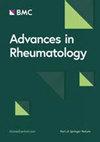Uncovering the knowledge about systemic amyloidosis relevant to the rheumatologists
IF 2.1
4区 医学
Q3 RHEUMATOLOGY
引用次数: 0
Abstract
Amyloidosis is a localized or systemic disease caused by deposition of proteins in the extracellular space of various organs and tissues. As part of the disease, proteins that were originally soluble misfold and acquire a fibrillar conformation that renders them insoluble and resistant to proteolysis. Systemic amyloidosis is a rare, often underdiagnosed condition. In recent years, the incidence of newly diagnosed cases of amyloidosis has been increasing in association with the aging of the population and greater access to diagnostic tests. From a clinical perspective, systemic amyloidosis is frequently associated with involvement of the kidneys (causing nephrotic syndrome), heart (cardiac failure and arrhythmia), and peripheral nervous system (sensorimotor polyneuropathy and autonomic dysfunction). This condition is important to the rheumatologist for several reasons, such as its systemic involvement that mimics autoimmune rheumatic diseases, its musculoskeletal manifestations, which when recognized can allow the diagnosis of amyloidosis, and also because reactive or secondary AA amyloidosis is a complication of rheumatic inflammatory diseases. The treatment of amyloidosis depends on the type of amyloid protein involved. Early recognition of this rare disease is fundamental for improved clinical outcomes.揭示与风湿病学家相关的系统性淀粉样变性知识
淀粉样变性是由于蛋白质沉积在各种器官和组织的细胞外空间而引起的局部或全身性疾病。在这种疾病中,原本可溶解的蛋白质会发生错误折叠,形成纤维状构象,使其无法溶解并抵抗蛋白质分解。全身性淀粉样变性是一种罕见的疾病,往往诊断不足。近年来,随着人口老龄化和诊断检测手段的普及,新诊断出的淀粉样变性病例的发病率不断上升。从临床角度来看,全身性淀粉样变性经常与肾脏(导致肾病综合征)、心脏(心力衰竭和心律失常)和周围神经系统(感觉运动多发性神经病和自主神经功能障碍)受累有关。这种疾病对风湿病学家来说非常重要,原因有很多,例如它的全身性受累会模仿自身免疫性风湿病,它的肌肉骨骼表现一旦被识别就可以诊断为淀粉样变性,还因为反应性或继发性 AA 淀粉样变性是风湿性炎症疾病的并发症。淀粉样变性的治疗取决于所涉及的淀粉样蛋白的类型。及早发现这种罕见疾病是改善临床疗效的基础。
本文章由计算机程序翻译,如有差异,请以英文原文为准。
求助全文
约1分钟内获得全文
求助全文
来源期刊

Advances in Rheumatology
Medicine-Rheumatology
CiteScore
4.00
自引率
4.30%
发文量
41
审稿时长
53 weeks
期刊介绍:
Formerly named Revista Brasileira de Reumatologia, the journal is celebrating its 60th year of publication.
Advances in Rheumatology is an international, open access journal publishing pre-clinical, translational and clinical studies on all aspects of paediatric and adult rheumatic diseases, including degenerative, inflammatory and autoimmune conditions. The journal is the official publication of the Brazilian Society of Rheumatology and welcomes original research (including systematic reviews and meta-analyses), literature reviews, guidelines and letters arising from published material.
 求助内容:
求助内容: 应助结果提醒方式:
应助结果提醒方式:


